Premium Only Content
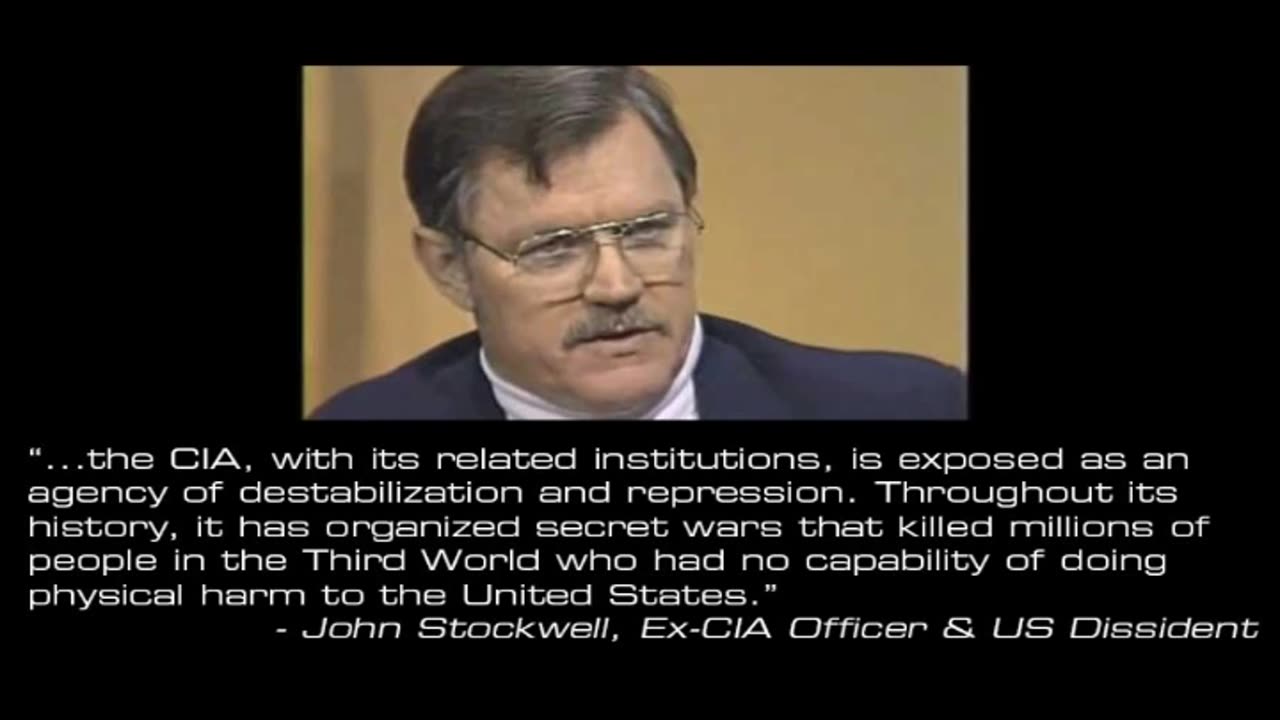
John Stockwell: The CIA & Perspectives During the Age of Glasnost (April 9, 1989)
Secret history of the CIA: https://thememoryhole.substack.com/
The age of Glasnost, particularly in 1989, marked a pivotal moment in history, notably for the Soviet Union under the leadership of Mikhail Gorbachev. Glasnost, which translates to "openness" or "transparency," represented a significant shift in Soviet policy, advocating for increased freedom of speech, press, and political openness.
During this time, there was a considerable thaw in the strict controls over information and expression that had characterized the Soviet system for decades. It allowed for more open discussions about social, political, and historical issues that were previously taboo. Glasnost aimed to foster public participation in governance, promote accountability, and address societal problems by acknowledging and discussing them openly.
In 1989, views on Glasnost were diverse. Some saw it as a promising step towards democratization and modernization within the Soviet Union. They believed it could lead to a more engaged and empowered citizenry, offering hope for positive reforms and an eventual shift towards a more liberal society.
However, others viewed Glasnost with skepticism or even opposition. Critics, both within and outside the Soviet Union, were concerned about the potential destabilizing effects of openness. There were fears that loosening the reins on information could lead to social unrest, challenge the authority of the Communist Party, or even lead to the disintegration of the Soviet state. Conservative factions within the USSR perceived Glasnost as a threat to the established order and the ideology that had maintained control for decades.
Internationally, the age of Glasnost sparked both hope and caution among global observers. Many saw it as an opportunity for improved relations between the East and the West, fostering greater dialogue and cooperation. However, there were also concerns about the uncertainties that accompanied such radical changes in a geopolitical landscape that had been defined by Cold War tensions for so long.
Ultimately, the age of Glasnost was a period of profound transformation and uncertainty, characterized by shifting perspectives on the potential for openness and reform within the Soviet Union and its implications both domestically and on the global stage. It set the stage for the eventual dissolution of the Soviet Union and reshaped the dynamics of international relations in the post-Cold War era.
Glasnost (/ˈɡlæznɒst/; Russian: гласность, IPA: [ˈɡlasnəsʲtʲ] ⓘ) is a concept relating to openness and transparency. It has several general and specific meanings, including a policy of maximum openness in the activities of state institutions and freedom of information and the inadmissibility of hushing up problems. In Russian the word 'гласность' has long been used to mean "openness" and "transparency". In the mid-1980s, it was popularised by Mikhail Gorbachev as a political slogan for increased government transparency in the Soviet Union within the framework of perestroika, and the calque of the word entered into English in the latter meaning.
Historical usage
In the Russian Empire of the late-19th century, the term was used in its direct meanings of "openness" and "publicity" and applied to politics and the judicial system. Some reforms were introduced towards reforms permitting attendance of the press and the public at trials. After some liberalization under Alexander II of Russia, the openness of trials started to be restricted again. [1] Human rights activist Lyudmila Alexeyeva writes that the word glasnost has been in the Russian language for several hundred years as a common term: "It was in the dictionaries and lawbooks as long as there had been dictionaries and lawbooks. It was an ordinary, hardworking, non-descript word that was used to refer to a process, any process of justice or governance, being conducted in the open."[2] In the mid-1960s it acquired a revived topical importance in discourse about the necessity of changing the cold-war era internal policy of the Soviet Union.
In the USSR
Politics of the Soviet Union
Leadership
Communist Party
Legislature
Governance
Judiciary
Ideology
Society
Economy
Agriculture Consumer goods Five-Year Plan Kosygin reform New Economic Policy Science and technology Era of Stagnation Material balance planning Transport War communism
Culture
Demographics Education Family Phraseology Religion
Repression
Censorship Censorship of images Great Purge Gulag system Collectivization Human rights Ideological repression Political abuse of psychiatry Political repression Population transfer Propaganda Suppressed research Red Terror Soviet Empire
flag Soviet Union portal
Other countries
vte
The first public rally near the KGB building in Moscow on Lubyanka Square in a memory of Stalin's victims on the Day of Political Prisoners, 30 October 1989
The dissidents
On 5 December 1965 the Glasnost rally took place in Moscow, considered to be a key event in the emergence of the Soviet civil rights movement.[citation needed] Protesters on Pushkin Square led by Alexander Yesenin-Volpin demanded access to the closed trial of Yuly Daniel and Andrei Sinyavsky. The protestors made specific requests for "glasnost", herein referring to the specific admission of the public, independent observers and foreign journalists, to the trial that had been legislated in the then newly issued Code of Criminal Procedure. With a few specified exceptions, Article 111 of the Code stated that judicial hearings in the USSR should be held in public.
Such protests against closed trials continued throughout the post-Stalin era. Andrei Sakharov, for example, did not travel to Oslo to receive his Nobel Peace Prize due to his public protest outside a Vilnius court building demanding access to the 1976 trial of Sergei Kovalev, an editor of the Chronicle of Current Events and prominent rights activist.[3]
Gorbachev
In 1986, Soviet General Secretary Mikhail Gorbachev and his advisers adopted glasnost as a political slogan, together with the term perestroika. Alexander Yakovlev, Head of the Propaganda Department of the Communist Party of the Soviet Union, is considered to be the intellectual force behind Gorbachev's reform program.[4]
Glasnost was taken to mean increased openness and transparency in government institutions and activities in the Soviet Union (USSR).[5] Glasnost reflected a commitment of the Gorbachev administration to allowing Soviet citizens to discuss publicly the problems of their system and potential solutions.[6] Gorbachev encouraged popular scrutiny and criticism of leaders, as well as a certain level of exposure by the mass media.[7]
Some critics, especially among legal reformers and dissidents, regarded the Soviet authorities' new slogans as vague and limited alternatives to more basic liberties. Alexei Simonov, president of the Glasnost Defence Foundation, makes a critical definition of the term in suggesting it was "a tortoise crawling towards Freedom of Speech".[8]
Various meanings
Between 1986 and 1991, during an era of reforms in the USSR, glasnost was frequently linked with other generalised concepts such as perestroika (literally: restructuring or regrouping) and demokratizatsiya (democratisation). Gorbachev often appealed to glasnost when promoting policies aimed at reducing corruption at the top of the Communist Party and the Soviet government, and moderating the abuse of administrative power in the Central Committee. The ambiguity of "glasnost" defines the distinctive five-year period (1986–1991) at the end of the USSR's existence. There was decreasing pre-publication and pre-broadcast censorship and greater freedom of information.
The "Era of Glasnost" saw greater contact between Soviet citizens and the Western world, particularly the United States: restrictions on travel were loosened for many Soviet citizens which further eased pressures on international exchange between the Soviet Union and the West.[9]
International relations
Gorbachev's interpretation of "glasnost" can best be summarised in English as "openness".[citation needed] While associated with freedom of speech, the main goal of this policy was to make the country's management transparent, and circumvent the holding of near-complete control of the economy and bureaucracy of the Soviet Union by a concentrated body of officials and bureaucratic personnel.[citation needed]
During Glasnost, Soviet history under Stalin was re-examined; censored literature in the libraries was made more widely available;[10][11] and there was a greater freedom of speech for citizens and openness in the media. It was in the late 1980s when most people in the Soviet Union began to learn about the atrocities of Stalin, and learned about previously suppressed events.
Information about the supposedly higher quality of consumer goods and quality of life in the United States and Western Europe began to be transmitted to the Soviet population,[12] along with western popular culture.[13]
Outside the Soviet Union
Glasnost received mixed reception in communist states, especially outside the Eastern Bloc.
Support
Glasnost had a trickle-down effect on Eastern Europe and lead to democratic reforms, namely in Poland and Czech Republic.[14] Glasnost and similar reforms were applied in the following communist states:
Bulgaria[15]
Czechoslovakia
East Germany[16]
Hungary[17]
Mongolia[18]
Poland[19]
Vietnam (see đổi mới)[20]
Furthermore, in the socialist state of Yugoslavia, similar reforms also existed, with the first major reforms beginning in Slovenia.[21]
Opposition
Glasnost or similar reforms were not applied in the following communist states:
China (had its own non-Soviet-inspired reforms)[22][23]
Cuba
Laos
North Korea[20]
Romania (opposed by Nicolae Ceaușescu)[24]
In Russia since 1991
The outright prohibition of censorship was enshrined in Article 29 of the new 1993 Constitution of the Russian Federation.[25] This however has been the subject of ongoing controversy in contemporary Russia owing to heightened governmental interventions restricting access to information for Russian citizens, including internet censorship. There has also been pressure on government-operated media outlets to not publicize or discuss certain events or subjects in recent years. Monitoring of the infringement of media rights in the years from 2004 to 2013 found that instances of censorship were the most commonly reported type of violation.[26]
See also
1965 Glasnost rally
Demokratizatsiya (Gorbachev's "Democratization")
Glasnost Bowl
Perestroika (Gorbachev's "Restructuring")
Uskoreniye (Gorbachev's "Acceleration")
Common knowledge (logic)
Mutual knowledge
Pluralistic ignorance
Stag hunt
Notes
"Гласность" . Brockhaus and Efron Encyclopedic Dictionary (in Russian). 1906.
Alexeyeva, Lyudmila; Goldberg, Paul (1990). The Thaw Generation: Coming of Age in the Post-Stalin Era. Pennsylvania: University of Pittsburgh Press. pp. 108–109.
"Before the Trials of Kovalyov and Tverdokhlebov, March-October 1975 (38.2)". 7 March 2016.
"Alexander Yakovlev, 81". The Globe and Mail. Toronto. Archived from the original on 20 October 2005. Retrieved 24 May 2013.
Milestones in Glasnost and Perestroyka: Politics and People. Brookings Institution Press. 1991. ISBN 0-8157-3623-1.
H., Hunt, Michael (26 June 2015). The world transformed : 1945 to the present. p. 315. ISBN 9780199371020. OCLC 907585907.
H., Hunt, Michael (26 June 2015). The world transformed : 1945 to the present. p. 316. ISBN 9780199371020. OCLC 907585907.
"Фонд Защиты Гласности". www.gdf.ru.
Arefyev, V.; Mieczkowski, Z. (1991). "International Tourism In The Soviet Union In The Era Of Glasnost And Perestroyka". Journal of Travel Research. 29 (4): 2–6. doi:10.1177/004728759102900401. S2CID 154312740.
Bruhn, Peter (1989). "Glasnost im sowjetischen Bibliothekswesen" [Glasnot in Soviet library]. Journal for Library and Bibliography. 36 (4): 360–366.
Shikman, Anatoly Pavlovich (1988). "Совершенно несекретно" [Completely unclassified]. Soviet Bibliography. 6 (231): 3–12.
Shane, Scott (1994). "Letting Go of the Leninist Faith". Dismantling Utopia: How Information Ended the Soviet Union. Chicago: Ivan R. Dee. pp. 212 to 244. ISBN 1-56663-048-7. "All this degradation and hypocrisy is laid not just at the feet of Stalin but of Lenin and the Revolution that made his rule possible."
Shane, Scott (1994). "A Normal Country: The Pop Culture Explosion". Dismantling Utopia: How Information Ended the Soviet Union. Chicago: Ivan R. Dee. pp. 182 to 211. ISBN 1-56663-048-7. "...market forces had taken over publishing..."
"Gorbachev's glasnost: the Soviet media in the first phase of perestroika". Choice Reviews Online. 37 (08): 37–4301-37-4301. 1 April 2000. doi:10.5860/choice.37-4301. ISSN 0009-4978.
Kamm, Henry (3 October 1987). "Back Seat for Glasnost Amid Bulgarian Drive". The New York Times.
Hager, Kurt (1990). "Glasnost Comes to East Germany". World Affairs. 152 (4): 198–207. JSTOR 20672242.
"Hungary Jumps Gun on Glasnost". 6 December 1988.
Henze, Paul B. (January 1989). "Mongolia faces glasnost and perestroika".
"GORBACHEV'S POLICY OF OPENNESS CHEERED BY POLISH LEADERS". The Journal of Commerce. 24 February 1987. Archived from the original on 9 November 2022.
"Can Vietnam's Doi Moi Reforms Be an Inspiration for North Korea? | Australian Strategic Policy Institute | ASPI".
"Slovenes set reform pace. In Yugoslavia, there is a group for nearly every cause as activists test limits of one-party state". Christian Science Monitor. 13 September 1988.
"China's Gorbachev phobia". 2 September 2022.
"A glasnost moment? Unlikely. The Chinese remember what happened to the". Independent.co.uk. 16 November 2013.
TISMANEANU, VLADIMIR (1987). "Ceausescu Against Glasnost". World Affairs. 150 (3): 199–203. JSTOR 20672144.
"Поиск по сайту | Конституция Российской Федерации". www.constitution.ru.
"mediaconflictsinrussia.org - mediaconflictsinrussia Resources and Information". ww16.mediaconflictsinrussia.org.
References
Look up glasnost in Wiktionary, the free dictionary.
Cohen, Stephen F.; Katrina Vanden Heuvel (1989). Voices of Glasnost: Interviews With Gorbachev's Reformers. W. W. Norton & Company. ISBN 0-393-30735-2.
Gibbs, Joseph (1999). Gorbachev's Glasnost: The Soviet Media in the First Phase of Perestroika. Texas A&M University Press. ISBN 0-89096-892-6.
Horvath, Robert (2005). The Legacy of Soviet Dissent: Dissidents, democratisation and radical nationalism in Russia. London & New York: Routledge Curzon. ISBN 0-415-33320-2.
vte
Revolutions of 1989
Internal
background
Era of Stagnation Communism Anti-communism Criticism of communist party rule Eastern Bloc Eastern Bloc politics Eastern Bloc media and propaganda Emigration from the Eastern Bloc KGB Nomenklatura Shortage economy Totalitarianism Anti-communist insurgencies in Central and Eastern Europe
International
background
Active measures Cold War List of socialist states People Power Revolution Predictions of the collapse of the Soviet Union Reagan Doctrine Soviet Empire Terrorism and the Soviet Union Vatican Opposition Warsaw Pact invasion of Czechoslovakia
Reforms
Uskoreniye Perestroika
Demokratizatsiya Khozraschyot 500 Days New political thinking Sinatra Doctrine Glasnost Chinese economic reform Socialism with Chinese characteristics Đổi Mới
Government
leaders
Ramiz Alia Nicolae Ceaușescu Mikhail Gorbachev Károly Grósz Erich Honecker Miloš Jakeš Egon Krenz Wojciech Jaruzelski Slobodan Milošević Mathieu Kérékou Mengistu Haile Mariam Ne Win Denis Sassou Nguesso Heng Samrin Deng Xiaoping Todor Zhivkov Siad Barre
Opposition
methods
Civil resistance Human chains Magnitizdat Polish underground press Political demonstration Protests Samizdat Strike action
Opposition
leaders
Lech Wałęsa Václav Havel Alexander Dubček Ion Iliescu Liu Gang Wu'erkaixi Chai Ling Wang Dan Feng Congde Tank Man Joachim Gauck Sali Berisha Sanjaasürengiin Zorig Vladimir Bukovsky Boris Yeltsin Viacheslav Chornovil Vytautas Landsbergis Zianon Pazniak Zhelyu Zhelev Aung San Suu Kyi Meles Zenawi Isaias Afwerki Ronald Reagan George H. W. Bush Pope John Paul II
Opposition
movements
Beijing Students' Autonomous Federation Charter 77 New Forum Civic Forum Democratic Party of Albania Democratic Russia Initiative for Peace and Human Rights Sąjūdis People's Movement of Ukraine Solidarity Popular Front of Latvia Popular Front of Estonia Public Against Violence Belarusian Popular Front Rastokhez National League for Democracy National Salvation Front Union of Democratic Forces Inter-regional Deputies Group Alliance of Free Democrats Hungarian Democratic Forum
Events
by location
Central and
Eastern Europe
Albania Bulgaria Czechoslovakia East Germany Hungary Poland Romania Soviet Union Yugoslavia
Soviet Union
Armenia Azerbaijan Belarus Chechnya Estonia Georgia Latvia Lithuania Kazakhstan Kyrgyzstan Moldova Russia Tajikistan Turkmenistan Ukraine Uzbekistan
Elsewhere
Afghanistan Angola Benin Burma Cambodia China Congo-Brazzaville Ethiopia Mongolia Mozambique Somalia South Yemen
Individual
events
Jeltoqsan 1987–1989 Tibetan unrest 1988 Polish strikes Polish Round Table Agreement April 9 tragedy Removal of Hungary's border fence with Austria Hungarian Round Table Talks Pan-European Picnic Baltic Way Monday Demonstrations Alexanderplatz demonstration Fall of the Berlin Wall Fall of the inner German border Malta Summit Black January 1990s post-Soviet aliyah Helsinki Summit Revolution on Granite Reunification of Germany January Events in Lithuania January Events in Latvia Transnistria War 1991 protests in Belgrade 1991 Belarusian strikes Dissolution of the Warsaw Pact August Coup Tajikistani Civil War Dissolution of Czechoslovakia
Later events
Colour revolution Decommunization Lustration Democratization Economic liberalization Post-Soviet conflicts Neo-Sovietism Neo-Stalinism Post-communism Yugoslav Wars Pink tide
Related
Human rights in the Soviet Union
vte
Cold War
US USSR NATO Warsaw Pact ANZUS METO NEATO SEATO TIAR Non-Aligned Movement
1940s
Morgenthau Plan Hukbalahap Rebellion Jamaican political conflict Dekemvriana Soviet stance in the Warsaw Uprising Percentages agreement Yalta Conference Guerrilla war in the Baltic states
Operation Priboi Operation Jungle Occupation of the Baltic states Cursed soldiers Operation Unthinkable Operation Downfall Potsdam Conference Gouzenko Affair Division of Korea Indonesian National Revolution Operation Masterdom Operation Beleaguer Operation Blacklist Forty Iran crisis of 1946 Greek Civil War Baruch Plan Corfu Channel incident Turkish straits crisis Restatement of Policy on Germany First Indochina War 1947 Polish parliamentary election Truman Doctrine Asian Relations Conference May 1947 crises Partition of India Indo-Pakistani War of 1947–1948 1947–1949 Palestine war
1947–1948 civil war in Mandatory Palestine 1948 Arab–Israeli War 1948 Palestinian expulsion and flight Marshall Plan Comecon 1948 Czechoslovak coup d'état Incapacitation of the Allied Control Council Al-Wathbah uprising Tito–Stalin split Berlin Blockade Annexation of Hyderabad Madiun Affair Western betrayal Iron Curtain Eastern Bloc Western Bloc Chinese Civil War
Chinese Communist Revolution Malayan Emergency March 1949 Syrian coup d'état Operation Valuable
1950s
Bamboo Curtain McCarthyism Political violence in the United States during the Cold War Korean War Arab Cold War (1952–1979) 1952 Egyptian Revolution Iraqi Intifada (1952) Mau Mau rebellion East German uprising of 1953 1953 Iranian coup d'état Pact of Madrid Bricker Amendment 1954 Syrian coup d'état Petrov Affair Domino theory 1954 Geneva Conference 1954 Guatemalan coup d'état Capture of the Tuapse First Taiwan Strait Crisis Jebel Akhdar War Algerian War Kashmir Princess Bandung Conference Geneva Summit (1955) Vietnam War Cyprus Emergency "On the Cult of Personality and Its Consequences" 1956 Poznań protests Hungarian Revolution of 1956 Polish October Suez Crisis "We will bury you" Operation Gladio Syrian Crisis of 1957 Sputnik crisis Ifni War Iraqi 14 July Revolution 1958 Lebanon crisis Second Taiwan Strait Crisis 1959 Mosul uprising 1959 Tibetan uprising Laotian Civil War Kitchen Debate Cuban Revolution
Consolidation of the Cuban Revolution Sino-Soviet split
1960s
Congo Crisis Simba rebellion 1960 U-2 incident Bay of Pigs Invasion 1960 Turkish coup d'état Albanian–Soviet split
Expulsion of Soviets from Albania Iraqi–Kurdish conflict
First Iraqi–Kurdish War Berlin Crisis of 1961 Berlin Wall Annexation of Goa Papua conflict Indonesia–Malaysia confrontation Sand War Portuguese Colonial War
Angolan War of Independence Guinea-Bissau War of Independence Mozambican War of Independence Cuban Missile Crisis El Porteñazo Sino-Indian War Communist insurgency in Sarawak Ramadan Revolution Eritrean War of Independence North Yemen Civil War 1963 Syrian coup d'état Assassination of John F. Kennedy Aden Emergency Cyprus crisis of 1963–1964 Shifta War Mexican Dirty War
Tlatelolco massacre Guatemalan Civil War Colombian conflict 1964 Brazilian coup d'état Dominican Civil War Rhodesian Bush War Indonesian mass killings of 1965–1966 Transition to the New Order (Indonesia) ASEAN Declaration 1966 Syrian coup d'état Cultural Revolution Argentine Revolution South African Border War Korean DMZ Conflict 12-3 incident Greek junta 1967 Hong Kong riots Years of Lead (Italy) Six-Day War War of Attrition Dhofar War Al-Wadiah War Nigerian Civil War Protests of 1968
May 68 Prague Spring USS Pueblo incident 1968 Polish political crisis Communist insurgency in Malaysia Warsaw Pact invasion of Czechoslovakia 17 July Revolution 1968 Peruvian coup d'état
Revolutionary Government 1969 Sudanese coup d'état 1969 Libyan revolution Goulash Communism Sino-Soviet border conflict New People's Army rebellion
1970s
Détente Nuclear Non-Proliferation Treaty Black September Alcora Exercise Corrective Movement (Syria) Western Sahara conflict Cambodian Civil War Communist insurgency in Thailand 1970 Polish protests Koza riot Realpolitik Ping-pong diplomacy 1971 JVP insurrection Corrective Revolution (Egypt) 1971 Turkish military memorandum 1971 Sudanese coup d'état Four Power Agreement on Berlin Bangladesh Liberation War 1972 visit by Richard Nixon to China North Yemen-South Yemen Border conflict of 1972 Yemenite War of 1972 Munich massacre 1972–1975 Bangladesh insurgency Eritrean Civil Wars 1973 Uruguayan coup d'état 1973 Afghan coup d'état 1973 Chilean coup d'état Yom Kippur War 1973 oil crisis Carnation Revolution Spanish transition to democracy Metapolitefsi Strategic Arms Limitation Talks Second Iraqi–Kurdish War Turkish invasion of Cyprus Angolan Civil War Cambodian genocide June 1976 protests Mozambican Civil War Oromo conflict Ogaden War 1978 Somali coup attempt Western Sahara War Ethiopian Civil War Lebanese Civil War Albanian–Chinese split Third Indochina War Cambodian–Vietnamese War Operation Condor Dirty War (Argentina) 1976 Argentine coup d'état Egyptian–Libyan War German Autumn Korean Air Lines Flight 902 Nicaraguan Revolution Uganda–Tanzania War NDF Rebellion Chadian–Libyan War Yemenite War of 1979 Grand Mosque seizure Iranian Revolution Saur Revolution Sino-Vietnamese War New Jewel Movement 1979 Herat uprising Seven Days to the River Rhine Struggle against political abuse of psychiatry in the Soviet Union
1980s
Salvadoran Civil War Soviet–Afghan War 1980 and 1984 Summer Olympics boycotts Gera Demands Peruvian Revolution Gdańsk Agreement
Solidarity Eritrean Civil Wars 1980 Turkish coup d'état Ugandan Bush War Gulf of Sidra incident Martial law in Poland Casamance conflict Falklands War 1982 Ethiopian–Somali Border War Ndogboyosoi War United States invasion of Grenada Able Archer 83 Star Wars 1985 Geneva Summit Iran–Iraq War Somali Rebellion Reykjavík Summit 1986 Black Sea incident South Yemen Civil War Toyota War 1987 Lieyu massacre Operation INFEKTION 1987–1989 JVP insurrection Lord's Resistance Army insurgency 1988 Black Sea bumping incident 8888 Uprising Solidarity (Soviet reaction) Contras Central American crisis Operation RYAN Korean Air Lines Flight 007 People Power Revolution Glasnost Perestroika Bougainville conflict First Nagorno-Karabakh War Afghan Civil War United States invasion of Panama 1988 Polish strikes Polish Round Table Agreement 1989 Tiananmen Square protests and massacre Revolutions of 1989 Fall of the Berlin Wall Fall of the inner German border Velvet Revolution Romanian Revolution Peaceful Revolution
1990s
Mongolian Revolution of 1990 Min Ping Yu No. 5540 incident Gulf War Min Ping Yu No. 5202 German reunification Yemeni unification Fall of communism in Albania Breakup of Yugoslavia Dissolution of the Soviet Union
1991 August Coup Dissolution of Czechoslovakia
Frozen conflicts
Abkhazia China-Taiwan Korea Kosovo Nagorno-Karabakh South Ossetia Transnistria Sino-Indian border dispute North Borneo dispute
Foreign policy
Truman Doctrine Containment Eisenhower Doctrine Domino theory Hallstein Doctrine Kennedy Doctrine Peaceful coexistence Ostpolitik Johnson Doctrine Brezhnev Doctrine Nixon Doctrine Ulbricht Doctrine Carter Doctrine Reagan Doctrine Rollback Kinmen Agreement
Ideologies
Capitalism
Liberalism Chicago school Conservatism
American conservatism Keynesianism Libertarianism Monetarism Neoclassical economics Reaganomics Supply-side economics Democratic capitalism
Socialism
Communism Marxism–Leninism Castroism Eurocommunism Guevarism Hoxhaism Juche Ho Chi Minh Thought Maoism Trotskyism Stalinism Titoism
Other
Imperialism Anti-imperialism Nationalism Ultranationalism Chauvinism Ethnic nationalism Racism Zionism Anti-Zionism Fascism Neo-Nazism Islamism Totalitarianism Authoritarianism Autocracy Liberal democracy Illiberal democracy Guided democracy Social democracy Third-Worldism White supremacy White nationalism White separatism Apartheid
Organizations
NATO SEATO METO EEC Warsaw Pact Comecon Non-Aligned Movement NN States ASEAN SAARC Safari Club
Propaganda
Pro-communist
Active measures Izvestia Neues Deutschland Pravda Rudé právo Trybuna Ludu TASS Soviet Life
Pro-Western
Amerika Crusade for Freedom Paix et Liberté Radio Free Europe/Radio Liberty Radio Free Asia Red Scare Voice of America
Technological
competition
Arms race Nuclear arms race Space Race
Historians
Gar Alperovitz Thomas A. Bailey Michael Beschloss Archie Brown Warren H. Carroll Adrian Cioroianu John Costello Michael Cox Nicholas J. Cull Norman Davies Willem Drees Robert D. English Herbert Feis Robert Hugh Ferrell André Fontaine Anneli Ute Gabanyi John Lewis Gaddis Lloyd Gardner Timothy Garton Ash Gabriel Gorodetsky Fred Halliday Jussi Hanhimäki John Earl Haynes Patrick J. Hearden Tvrtko Jakovina Tony Judt Harvey Klehr Gabriel Kolko Walter LaFeber Walter Laqueur Melvyn P. Leffler Geir Lundestad Vojtech Mastny Jack F. Matlock Jr. Thomas J. McCormick Timothy Naftali Marius Oprea David S. Painter William B. Pickett Ronald E. Powaski Yakov M. Rabkin Mary Elise Sarotte Arthur M. Schlesinger Jr. Ellen Schrecker Giles Scott-Smith Shen Zhihua Timothy Snyder Athan Theoharis Andrew Thorpe Vladimir Tismăneanu Patrick Vaughan Alex von Tunzelmann Odd Arne Westad William Appleman Williams Jonathan Reed Winkler Rudolph Winnacker Ken Young
Espionage and
intelligence
List of Eastern Bloc agents in the United States Soviet espionage in the United States Russian espionage in the United States American espionage in the Soviet Union and Russian Federation CIA and the Cultural Cold War CIA MI5 MI6 United States involvement in regime change Soviet involvement in regime change MVD KGB Stasi
See also
Allied intervention in the Russian Civil War Soviet Union–United States relations Soviet Union–United States summits Russia–NATO relations War on terror Brinkmanship Second Cold War Russian Revolution
Category List of conflicts Timeline
vte
Soviet Union topics
History
Index of Soviet Union–related articles Russian Revolution
February October Russian Civil War Russian SFSR Creation treaty New Economic Policy Stalinism Great Purge Great Patriotic War (World War II) Cold War Khrushchev Thaw Sino-Soviet split Soviet space program 1965 economic reform Stagnation Soviet–Afghan War Perestroika Glasnost Revolutions of 1989 Dissolution Post-Soviet states Nostalgia
Geography
Subdivisions
Republics
Autonomous Krais Oblasts
Autonomous Autonomous okrugs Closed cities
List
Regions
Caspian Sea Caucasus Mountains European Russia North Caucasus Siberia Ural Mountains West Siberian Plain
Politics
General
Constitution Elections Foreign relations
Brezhnev Doctrine Government
List Human rights
LGBT Law Leaders
Collective leadership Passport system State ideology
Marxism–Leninism Leninism Stalinism
Bodies
Communist Party
organisation Central Committee
Presidium/Politburo Secretariat Congress General Secretary Congress of Soviets (1922–1936) Supreme Soviet (1938–1991) Congress of People's Deputies (1989–1991) Supreme Court
Military Collegium
Offices
Heads of state
President Premier Deputy Premier First Deputy Premier
Security services
Cheka GPU NKVD
Destruction battalions MVD
Militsiya MGB KGB
Chairmen Soviet Border Troops Soviet Armed Forces
Soviet Army/Spetsnaz GRU • Soviet Navy • Soviet Air Forces/Soviet Airborne Forces
Political repression
Red Terror Collectivization Great Purge Population transfer Gulag
List Holodomor Political abuse of psychiatry
Ideological repression
Religion Science Censorship Censorship of images
Economy
Agriculture Central Bank Economic planning Energy policy Five-year plans Internet domain Inventions Net material product OGAS Science and technology Rouble (currency) Transport
List of metro systems
Science
Communist Academy Cybernetics in the Soviet Union Academy of Sciences Academy of Medical Sciences Lenin All-Union Academy of Agricultural Sciences Sharashkas Naukograds
List
Society
Crime Demographics
Soviet people Working class 1989 census Languages
Linguistics
Culture
Ballet Cinema Fashion Literature Music
Opera Propaganda Sports Stalinist architecture
Opposition
Soviet dissidents and their groups
List
Symbols
Anthem
Republics Emblem
Republics Flag
Republics Hammer and sickle
flag Soviet Union portal Category
Authority control databases Edit this at Wikidata
National
Germany Israel United States
Other
Encyclopedia of Modern Ukraine
-
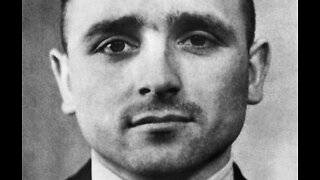 4:26:48
4:26:48
The Memory Hole
1 month agoThe Life and Times of Klaus Barbie
762 -
 1:05:48
1:05:48
Mikhaila Peterson
6 days agoDoctor On The Carnivore Diet and Fertility | Robert Kiltz EP 218
89.4K35 -
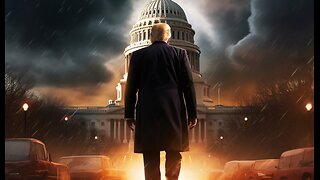 2:46:06
2:46:06
DDayCobra
15 hours ago $21.17 earnedCobraCast 199
89.4K19 -
 2:07:27
2:07:27
TheSaltyCracker
14 hours agoTrump Tower Bombed w/ Cybertruck ReeEEeE Stream 01-01-25
200K443 -
 8:15:58
8:15:58
FreshandFit
21 hours agoElon Musk BETRAYAL & Mass Censorship On X
247K107 -
 2:25:43
2:25:43
Darkhorse Podcast
22 hours agoLooking Back and Looking Forward: The 258 Evolutionary Lens with Bret Weinstein and Heather Heying
235K221 -
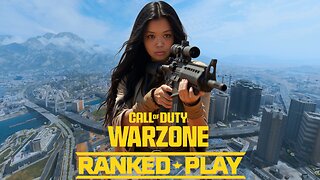 5:50:16
5:50:16
Pepkilla
20 hours agoRanked Warzone ~ Are we getting to platinum today or waaa
151K7 -
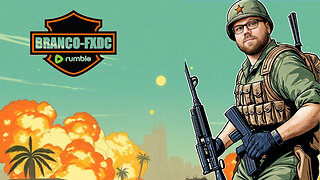 9:15:09
9:15:09
BrancoFXDC
18 hours ago $9.88 earnedHAPPY NEW YEARS - Road to Platinum - Ranked Warzone
123K4 -
 5:53
5:53
SLS - Street League Skateboarding
5 days agoBraden Hoban’s San Diego Roots & Hometown Win | Kona Big Wave “Beyond The Ride” Part 2
124K14 -
 6:03:57
6:03:57
TheBedBug
23 hours ago🔴 LIVE: EPIC CROSSOVER - PATH OF EXILE 2 x MARVEL RIVALS
117K9